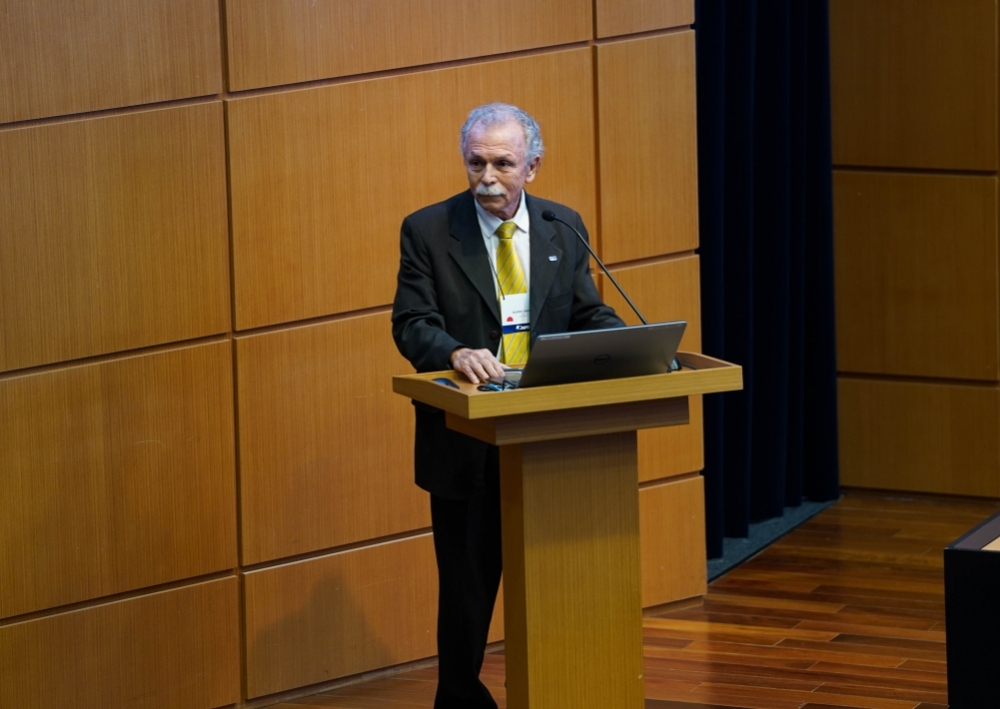


Ricardo Galvão, President of the National Council for Scientific and Technological Development (CNPq), discussed the status quo and outlook for Brazilian science in the first of the 2023 FAPESP Lectures (photo: Daniel Antonio/Agência FAPESP)
Published on 05/15/2023
By José Tadeu Arantes | Agência FAPESP – The title of an article published in 2021 expressed concern about the threats to scientific progress in Brazil: “Brazilian science: towards extinction?” Appearing in a journal published by Oswaldo Cruz Institute, a research arm of Brazil’s Health Ministry, the article included a chart showing in a particularly shocking way the annual ups and downs in the federal budget for science and technology over a 20-year period, with a sharp decline since 2013.
The article was cited in a presentation delivered by Ricardo Galvão, President of the National Council for Scientific and Technological Development (CNPq) – a research funding agency linked to the Ministry for Science, Technology and Innovation (MCTI) – as evidence for the dismantling of Brazilian science in the context of denialism and curtailment of intellectual activity.
Galvão himself was attacked during his term as head of the National Space Research Institute (INPE). President Jair Bolsonaro simply announced that he had demanded Galvão’s ouster after INPE published data showing a huge increase in deforestation in Brazil in 2019. For his defense of scientific activity during this episode, he ranked first among the top ten people who mattered in science in 2019 according to the journal Nature.
Galvão is a professor at the University of São Paulo’s Physics Institute (IF-USP) and a former director of the Brazilian Center for Research in Physics (CBPF), a former President of the Brazilian Physical Society (SBF) and a former member of the Council of the European Physical Society (EPS). He was appointed to lead CNPq in 2023. He was specially invited to deliver the opening address in the 2023 FAPESP Lectures, entitled “Science in Brazil: Current Status and Outlook”.
“To be able to speak about the future, we must see if we have achieved any of the things we promised to do in the past,” he said, recalling the Fourth National Conference on Science, Technology and Innovation held in 2010. He referred to the Blue Book with the proceedings of the conference (Livro Azul), highlighting proposals regarding the link between innovation and sustainability; new opportunities for Brazil in agriculture, bioenergy, information and communications technology (ICT), and deep-sea oil drilling; and the sustainable use of biodiversity, ocean resources and the Amazon. “Have we made any progress on all this?” he asked.
The rest of his presentation provided answers to this question. After comparing the promises of 2010 with the somber outlook that emerged in 2013, and especially after 2019, Galvão focused on two aspects of his subject: disruptive contributions in science and technology; and the benefits of scientific activity for society. Recalling that knowledge is now one of the most precious assets available, he said “our nation is not scientifically literate enough to evolve in the knowledge economy”, and appealed to public administrators, especially in science and technology funding organizations, to pay more attention to this problem.
He went on to discuss CNPq’s success in achieving the agenda set in 2010, showing that despite the many problems it has faced, the institution ranks tenth in the world among agencies that fund research directly relating to the Sustainable Development Goals (SDGs) adopted by the United Nations (China’s agency is far and away number one). He also highlighted the creation in 2008 of the National Science and Technology Institute Program (INCTs) when CNPq was led by Professor Marco Antonio Zago, currently President of FAPESP.
Analyzing the evolution of CNPq’s budget, Galvão noted an increase this year in the values of its scientific initiation, master’s, doctoral and postdoctoral scholarships, which had depreciated sharply. At the same time, he added, there is a significant disparity between spending on scholarships and investment in research funding, which should be CNPq’s priority and corresponds to only 11.6% of total expenditure.
“The solution is more investment. And as strategies for the future, we want to focus on collaboration with the state research funding agencies [FAPs] to bring back programs like Pronem [Program to Support Emerging Research Centers] and Pronex [Program to Support Centers of Excellence],” he said, noting that several successful INCTs have become national institutions in their own right.
Among the policies that are being studied by CNPq’s top management, he mentioned five that could have a major impact if implemented, especially for graduate students and young researchers: lifting the ban on having a paid job while receiving a scholarship; support for “novation” to let researchers with scholarships abroad remain there while collaborating on specific projects conducted in Brazil; introduction of temporary jobs for recent PhDs; verification of the possibility of temporary jobs for scholarship awardees; and removal of the requirement that research proposals be submitted to CNPq’s calls only by scholarship holders.
A video of Ricardo Galvão’s presentation is at: www.youtube.com/watch?v=jR_nhA0jwVw.
Source: https://agencia.fapesp.br/41382